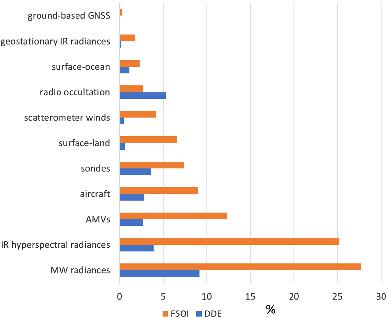当前位置:
X-MOL 学术
›
Q. J. R. Meteorol. Soc.
›
论文详情
Our official English website, www.x-mol.net, welcomes your feedback! (Note: you will need to create a separate account there.)
Observation impact metrics in NWP: A theoretical study. Part I: Optimal systems
Quarterly Journal of the Royal Meteorological Society ( IF 8.9 ) Pub Date : 2021-07-06 , DOI: 10.1002/qj.4123 J. R. Eyre 1
Quarterly Journal of the Royal Meteorological Society ( IF 8.9 ) Pub Date : 2021-07-06 , DOI: 10.1002/qj.4123 J. R. Eyre 1
Affiliation

|
Two methods are widely used to assess the impact of observations in global numerical weather prediction (NWP): data denial experiments (DDEs) and the forecast sensitivity-based observation impact (FSOI) method. A DDE measures the impact on forecast accuracy of removing an observation type from the system, whereas FSOI measures the amount by which an observation type reduces the short-range forecast error (within a system containing all observation types). It is usually found, in global NWP experiments in which both methods are used, that the FSOI impact of a given observation type is greater than its DDE impact. The aim of this article is to present the theory behind the DDE and FSOI metrics that are commonly used and to explore factors that cause DDE and FSOI metrics to give different results. The general theory is presented for an optimal analysis and forecast system and then applied to a simple model with two state variables. To explain the commonly found result of FSOI impact greater than DDE impact, the following system properties are found to be important: mixing of information (and error) by the forecast model between state variables, the rate of forecast error growth, the presence of forecast model error, the way in which observational information is distributed between state variables and denied from them, and the presence of error in the data used for forecast verification. These results provide insight into why NWP systems are resilient to the removal of observational information; they are shown to be resilient if information is denied primarily from well-observed variables but not when denied primarily from poorly observed variables.
中文翻译:

NWP 中的观测影响指标:一项理论研究。第一部分:最优系统
两种方法被广泛用于评估观测对全球数值天气预报 (NWP) 的影响:数据拒绝实验 (DDE) 和基于预测灵敏度的观测影响 (FSOI) 方法。DDE 衡量从系统中删除观测类型对预测准确性的影响,而 FSOI 衡量观测类型减少短期预测误差的量(在包含所有观测类型的系统内)。通常发现,在使用两种方法的全球 NWP 实验中,给定观测类型的 FSOI 影响大于其 DDE 影响。本文旨在介绍常用的 DDE 和 FSOI 指标背后的理论,并探讨导致 DDE 和 FSOI 指标给出不同结果的因素。提出了最佳分析和预测系统的一般理论,然后将其应用于具有两个状态变量的简单模型。为了解释 FSOI 影响大于 DDE 影响的常见结果,发现以下系统属性很重要:状态变量之间预测模型的信息(和误差)混合、预测误差增长的速率、预测的存在模型误差,观测信息在状态变量之间分布和拒绝它们的方式,以及用于预测验证的数据中存在的误差。这些结果让我们深入了解 NWP 系统为何对观测信息的移除具有弹性;
更新日期:2021-09-06
中文翻译:

NWP 中的观测影响指标:一项理论研究。第一部分:最优系统
两种方法被广泛用于评估观测对全球数值天气预报 (NWP) 的影响:数据拒绝实验 (DDE) 和基于预测灵敏度的观测影响 (FSOI) 方法。DDE 衡量从系统中删除观测类型对预测准确性的影响,而 FSOI 衡量观测类型减少短期预测误差的量(在包含所有观测类型的系统内)。通常发现,在使用两种方法的全球 NWP 实验中,给定观测类型的 FSOI 影响大于其 DDE 影响。本文旨在介绍常用的 DDE 和 FSOI 指标背后的理论,并探讨导致 DDE 和 FSOI 指标给出不同结果的因素。提出了最佳分析和预测系统的一般理论,然后将其应用于具有两个状态变量的简单模型。为了解释 FSOI 影响大于 DDE 影响的常见结果,发现以下系统属性很重要:状态变量之间预测模型的信息(和误差)混合、预测误差增长的速率、预测的存在模型误差,观测信息在状态变量之间分布和拒绝它们的方式,以及用于预测验证的数据中存在的误差。这些结果让我们深入了解 NWP 系统为何对观测信息的移除具有弹性;


























 京公网安备 11010802027423号
京公网安备 11010802027423号